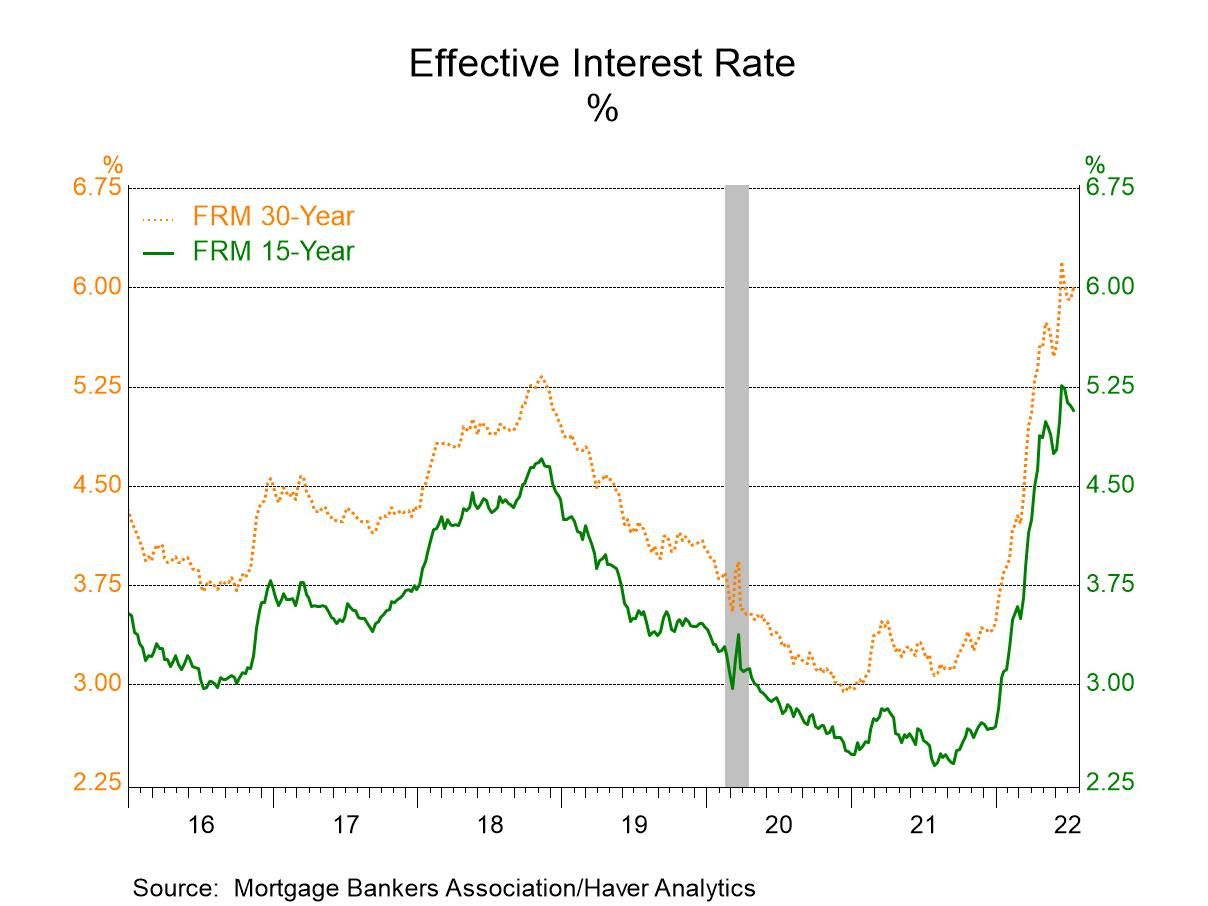U.S. Mortgage Applications Continued to Rise, but only Slightly
by:Sandy Batten
|in:Economy in Brief
Summary
• Loan applications increased for third consecutive week.
• Refinancing applications rebounded while purchase applications were essentially unchanged.
• Interest rates eased slightly.


The Mortgage Bankers Association reported that mortgage applications edged up 0.7% w/w (-49.5% y/y) in the week ended June 24 following a 4.2% w/w gain in the previous week. This was their third consecutive weekly increase after four consecutive weekly declines. In contrast to the gain in the previous week, the increase in the most recent week was led by refinancing applications, which rose 1.9% w/w (-74.6% y/y) after having fallen 3.1% w/w in the prior week. Applications for home purchase were essentially unchanged last week, edging up just 0.1% w/w (-4.7% y/y) following a 7.9% w/w jump in the previous week.
The share of applications for refinancing rose to 30.3% in the week ended June 24 from 29.7% in the previous week. This percentage has generally declined during 2022. The percentage of applications that were ARMs fell to 10.1% after having jumped to 10.6% in the previous week.
Applications for fixed-rate loans rose 1.3% w/w (-52.9% y/y) in the June 24 week, the same weekly rise as in the prior week. Applications for adjustable-rate mortgages fell 4.4% w/w (+41.2% y/y) after surging 36.6% w/w in the previous week.
The effective interest rate on 30-year fixed-rate loans declined to 6.02% in the week of June 24 from 6.20% in the prior week. This was the first weekly decrease in the past four weeks. This rate has increased 255 basis points since the end of 2021. The rate on 15-year fixed-rate mortgages slipped two basis points to 5.24%. The rate on 30-year Jumbos declined 12 basis points to 5.50% while the rate on 5-year ARMs fell 18 basis points to 4.91%%.
The average loan size decreased 3.1% w/w to $371,000 in the week of June 24. It has fallen from a series high of $401,900 reached in the week ended May 6. The average size of a purchase loan fell 2.0% w/w to $413,500. The average refinancing loan size slumped 5.8% w/w to $273,300.
The Mortgage Bankers Survey covers 75% of all U.S. retail residential mortgage applications and has been conducted weekly since 1990. Respondents include mortgage bankers, commercial banks, and thrifts. The base period and value for all indexes is March 16, 1990=100.
These figures for weekly mortgage applications and interest rates are available in Haver's SURVEYS database.
Sandy Batten
AuthorMore in Author Profile »Sandy Batten has more than 30 years of experience analyzing industrial economies and financial markets and a wide range of experience across the financial services sector, government, and academia. Before joining Haver Analytics, Sandy was a Vice President and Senior Economist at Citibank; Senior Credit Market Analyst at CDC Investment Management, Managing Director at Bear Stearns, and Executive Director at JPMorgan. In 2008, Sandy was named the most accurate US forecaster by the National Association for Business Economics. He is a member of the New York Forecasters Club, NABE, and the American Economic Association. Prior to his time in the financial services sector, Sandy was a Research Officer at the Federal Reserve Bank of St. Louis, Senior Staff Economist on the President’s Council of Economic Advisors, Deputy Assistant Secretary for Economic Policy at the US Treasury, and Economist at the International Monetary Fund. Sandy has taught economics at St. Louis University, Denison University, and Muskingun College. He has published numerous peer-reviewed articles in a wide range of academic publications. He has a B.A. in economics from the University of Richmond and a M.A. and Ph.D. in economics from The Ohio State University.
More Economy in Brief
 Global| Feb 05 2026
Global| Feb 05 2026Charts of the Week: Balanced Policy, Resilient Data and AI Narratives
by:Andrew Cates






